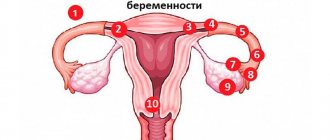Loose stools combined with dizziness are not always a sign of a serious illness. Sometimes such ailments occur with prolonged stress, fatigue, eating and sleeping disorders.
In these cases, treatment consists of eliminating the factors leading to disruptions in the body - maintaining a daily routine, a balanced diet, reducing stress and getting proper rest.
If dizziness and diarrhea last for a long time, accompanied by other unpleasant symptoms, this is a reason to immediately contact a clinic to determine an accurate diagnosis.
Causes
In most cases, such manifestations are characteristic of poisoning, inflammation of the gastrointestinal tract or infectious diseases, the most common of which is intestinal flu.
You need to worry about your health if:
- There is severe nausea, progressing to vomiting. Diarrhea is profuse and frequent, abdominal pain, rumbling and bloating are possible. The temperature may be elevated. This is not always accompanied by dizziness, but most likely it is food poisoning. The first signs of the disease appear soon after eating low-quality foods.
- Hours of vomiting and diarrhea, which has a characteristic yellow color and an unpleasant sour smell, are one of the manifestations of intestinal flu. This disease is also characterized by a rise in temperature.
- Infection with salmonella does not always lead to high fever and can be avoided without dizziness, but is always accompanied by diarrhea and vomiting. In this case, there may be blood in the stool.
- Nausea, vomiting, rising fever and loose stools, sometimes accompanied by headache and weakness leading to dizziness, can often be symptoms of dysentery.
- Dizziness, diarrhea, nausea and fever can also be symptoms of cholera, typhoid fever, botulism, viral hepatitis and other serious infections.
Only an infectious disease doctor or gastroenterologist can determine the exact cause of problems in your body, so if symptoms continue for more than one day, consult a specialist or call an ambulance.
The absence or presence of diarrhea, nausea and vertigo, as dizziness is often called, up to darkening of the eyes are also characteristic of chemical poisoning or an attack of hypertension. Self-medication is contraindicated here.
Other illnesses causing diarrhea (diarrhea), nausea and headache with severe weakness
What could happen if nausea and diarrhea appeared at the same time? If everything is in order with your diet, the food is fresh and of high quality, but after eating it you are bothered by an unpleasant feeling of nausea and diarrhea, it is worth checking the functioning of your digestive organs. Many gastrointestinal diseases are manifested by diarrhea, nausea against a background of general weakness and headaches:
1 Gastritis and feeling of nausea and weakness, problems with stool. When the gastric mucosa is inflamed due to the influence of stress factors, allergies, excessive dosage of medications, consumption of hot, spicy, fatty foods, attacks of nausea and diarrhea appear. Such symptoms, in the form of stool disturbances (diarrhea like water), weakness and a feeling of nausea, are characteristic of the acute course of the disease. If the patient consults a gastroenterologist in time, the course of therapy helps restore the integrity of the mucous membrane, relieve the inflammatory process and help normalize the digestive function of the stomach. The chronic form of gastritis requires much longer therapy, a strict diet for the entire period of the disease until complete recovery. The sharp pains that occur after each meal, periodic nausea and diarrhea should gradually go away.
2 Pancreatitis. This disease is characterized by abnormalities in the functioning of the pancreas caused by an inflammatory process in its tissues. Disorder of the pancreas functions disrupts the entire digestive process. The pancreatic juices secreted by the organ contain a set of certain enzymes involved in the breakdown of food into its component parts, which must be absorbed by the body. Inflamed gland tissue is not able to provide sufficient levels of enzymes, which means proteins, fats and carbohydrates are not subject to a sufficient level of breakdown. During the acute form of the disease, the patient suffers from severe epigastric pain radiating to the back area. Often they become encircling in nature. Severe nausea appears periodically, accompanied by headache and diarrhea. Pancreatitis requires an urgent course of therapy, since pancreatic tissue is restored very slowly, and a chronic process can lead to the development of pancreatic necrosis.
Help from traditional medicine
- An infusion of cumin can help combat diarrhea in adults and children. To prepare it, you need to pour two tablespoons of plant seeds into a thermos and pour a glass of boiling water. Leave for 15 minutes, then strain and cool to a pleasant temperature. Take 50-100 ml three times a day after meals. Store in the refrigerator for no more than two days.
- Caraway oil, which is sold in specialized stores or on the Internet, will also help normalize stool. Three drops of the substance should be applied to a piece of refined sugar and eaten. You should not take more than five pieces of sugar and butter per day.
- Plantain infusion helps with dizziness. To prepare it, you need to take a tablespoon of carefully crushed dry plantain leaf, pour a glass of boiling water and leave for half an hour. Then cool, strain, add a teaspoon of honey, stir and drink the entire volume before bed. The course of treatment is 10 days.
Remember that only a correct diagnosis and appropriate treatment will lead you to rapid healing without unpleasant consequences.
By properly combining medications, proper nutrition and traditional medicine, you will very soon forget about your ailments and be full of strength and health again.
Headaches and abdominal pain during pregnancy
Sometimes pregnant women begin to suffer from severe headaches. This happens due to hormonal changes in a woman’s body. Changes are also observed in the composition of the blood: it flows in large quantities to the pelvic region and lower extremities. Due to less blood flow to the brain, it begins to suffer from a lack of nutrients and oxygen, which is why regular headaches occur.
In addition, the causes of headaches in the 1st trimester of pregnancy can be low blood pressure and early toxicosis. But in the 2nd trimester, women can develop hypertension, which is why severe pain occurs in the back of the head.
Pregnant women are very sensitive to weather changes, various physical and stress loads, as all these factors can lead to headaches.
Headaches in pregnant women can even be triggered by certain foods that previously did not cause any discomfort. These may be foods containing nitrogen compounds, spicy or fatty foods, a number of fruits, chocolate and coffee.
Abdominal pain in a woman carrying a child can also have different causes. They are divided into obstetric and non-obstetric. The first include such as the risk of miscarriage, ectopic pregnancy, placental abruption.
And in the second case, doctors will say about disruption of the gastrointestinal tract during pregnancy. First of all, the stomach suffers due to its compression by the growing uterus. Also, a pregnant woman is more likely to experience constipation and intestinal motility is impaired.
Poor nutrition during pregnancy can be another cause of abdominal pain. Sharp spasms and aching pain in the lower abdomen occur in various parts of the intestines. After the digestive process is completed, pain and cramps subside for a while - until the next meal.
In order for such sensations to stop, it is necessary to radically change the diet: drink more and a variety of drinks; eat vegetables and fruits rich in fiber; you need to spend more time outdoors.
During pregnancy, the ligaments that support the uterus begin to stretch as the fetus grows. And this stretching can also cause pain in the lower abdomen.
Nausea, diarrhea and dizziness as possible symptoms of deadly infections
Symptoms such as weakness, nausea, dizziness, and diarrhea are familiar to almost every person. Most associate their occurrence with banal food poisoning, which is most often not far from the truth. But such symptoms often indicate more serious problems, which only a doctor can determine after a full examination.
Such symptoms cannot be tolerated - diarrhea quickly causes severe dehydration of the body, which has an extremely negative impact on the functioning of all internal organs and systems. The situation is aggravated by vomiting, which is often associated with nausea. If nausea, diarrhea, and dizziness are caused by intoxication, lack of treatment can lead to serious impairment of hemostasis, ketoacidosis and coma.
Typical symptoms of poisoning
Main causes of the disease
Symptoms such as vomiting, diarrhea, and dizziness can be caused by a variety of reasons - from dangerous infections to the consumption of low-quality products.
Often the cause of this condition is the diets that girls are so keen on in their desire to quickly lose weight. But most often, the above symptoms indicate the presence of a fairly serious pathology.
Some of the most likely ones include:
- Acute gastroenteritis. This is an acute intestinal infection in which diarrhea, loss of appetite and vomiting occur against the background of severe pain in the epigastric region. Subsequently, there is an increase in body temperature.
- Hypoglycemia. Against the background of a sudden drop in blood glucose levels, the body begins to produce large quantities of adrenaline, a hormone that increases blood pressure and stimulates the activity of the heart. Against this background, a person begins to feel nauseous, severe dizziness and weakness develop, coordination is impaired, and confusion appears.
- Vegetovascular dystonia. An imbalance between the sympathetic and parasympathetic parts of the autonomic nervous system makes itself felt with a wide variety of symptoms - the eyes begin to darken, severe fatigue and dizziness appear, and a lot of dyspeptic disorders occur.
- Acute gastritis. This is an inflammation of the gastric mucosa, which results in damage to epithelial cells. It is a common cause of nausea, vomiting, diarrhea and dizziness. Later, the skin becomes pale, the tongue becomes covered with a grayish coating, and palpation of the epigastrium is painful.
In acute gastritis, signs of gastric dyspepsia come to the fore
This condition can be caused by serious infections that require immediate hospitalization. These include:
- salmonellosis;
- dysentery;
- Escherichiosis;
- cholera;
- typhoid fever;
- viral hepatitis A;
- botulism.
It is impossible to independently determine the cause of the disorder - a full examination in a clinical setting is required. You should not hesitate to see a doctor - some infections require prompt resuscitation and can lead to death.
First aid for a person with poisoning
Treatment for an abundance of gastroenterological symptoms can only be prescribed by a doctor after a comprehensive examination. However, first aid should be provided immediately - this will increase the effectiveness of further treatment and alleviate the patient’s condition.
Medicines used for poisoning
Before the medical team arrives, you can take the following actions yourself:
- give the person more liquid to drink - warm sweet tea, still mineral water, pharmaceutical drugs such as rehydron, reosolan, glucosolan;
- give 10-20 tablets of activated carbon or any other enterosorbent (Polysorb, Enterosorb) to drink;
- You can use antacids to eliminate nausea caused by irritation of the gastric mucosa;
- to relieve diarrhea, you can use drugs such as Imodium, Pentasa, loperamide;
- In the absence of spontaneous vomiting, you can try to induce it artificially after taking a large amount of liquid.
Severe pain in the abdomen should not be tried to be relieved with analgesics before the arrival of doctors - this will blur the clinical picture and make it difficult to make a diagnosis. For severe spasms, you can take no-shpa or drotaverine.
Diagnostic measures
All patients with severe digestive disorders, the symptoms of which cannot be controlled at the prehospital stage, are subject to examination in a hospital setting. Initially, the doctor will collect an anamnesis - the fact of possible consumption of low-quality products, the duration of diarrhea, stool consistency, color and smell of stool are important.
Then the abdomen is palpated, stool, urine and blood tests are prescribed - general and in some cases biochemical. In the presence of vomiting, vomit is also subject to laboratory testing. Instrumental diagnostic methods include ECG and Echo ECG.
Treatment
In a hospital setting, treatment is prescribed in accordance with the established diagnosis. If the cause of the condition is infectious agents, specific treatment is prescribed. In other cases it is symptomatic. Drugs of the following pharmacological groups can be used:
- antibiotics;
- enzymes;
- antacids;
- agents that protect the gastric mucosa;
- hepatoprotectors;
- vitamin and mineral complexes.
The positive effect of jelly on the gastrointestinal tract helps speed up a person’s recovery
In case of food poisoning, a fairly strict diet is prescribed. During the month, the patient's diet completely excludes rich broths, smoked foods, fatty and spicy foods, whole milk, fatty cottage cheese and butter. It is recommended to eat small meals at least 5-6 times a day.
Preference should be given to boiled products (steaming is allowed). Animal protein should not be excluded, but meat and fish should be of low-fat varieties. The transition to the usual diet is possible after complete elimination of the symptoms of the disease.
It should be gradual - fatty/fried foods must be introduced into the diet gradually.
Source: https://GolovaLab.ru/vertigo/toshnota-slabost-ponos-i-golovokruzhenie.html
Intestinal (stomach) flu – fever, vomiting, diarrhea – Diagnostician
Yesterday, for the first time in my life, I shit and vomited at the same time. I didn't even think that this was possible. Dmitriy
Every year, 25 million people on planet Earth suffer from viral gastroenteritis. This scourge is popularly called intestinal or stomach flu.
Fever, aches, headache, nausea, VOMITING, DIARRHEA
Affecting the stomach and intestines, rotaviruses, enteroviruses (noroviruses), astroviruses, and adenoviruses cause repeated vomiting and uncontrollable diarrhea.
Intestinal (stomach) flu is transmitted from person to person through kissing and coughing, as well as through dishes, hygiene items and the toilet. You can get infected through water - bleach does not kill the virus!!! By attacking everyone around, the virus spreads quickly. Often entire families, classes, departments, divisions get sick...
. Uncontrollable vomiting by the whole family
The health of those infected can vary greatly, from mild illness to life-threatening conditions. The most vulnerable are young children and the elderly. Do not give up! It will be unpleasant, but not for long. In adults, intestinal flu lasts 12-48 hours, and in young children up to 5-7 days.
IMPORTANT!!! 3-5 days after recovery, the person is still contagious.
A cure for intestinal (stomach) flu has NOT yet been invented
Antibiotics (ersefuril, furazolidone, chloramphenicol, etc.) do not act on the virus, but they destroy the normal intestinal microflora.
Domestic know-how : instrumentation, viferon, arbidol - do not affect the duration and severity of intestinal flu. However, in Russia they have become an important means of psychotherapy - something must be done.
If you have vomiting and/or diarrhea:
- stop eating;
- do not push medications into yourself, for example, activated carbon or smecta - vomiting will intensify;
- drink liquids (water, tea, compote, jelly) in small sips - unfortunately, in the first hours of illness this also increases vomiting;
- if there is repeated vomiting, and even diarrhea, it’s time to drink saline solutions (gastrolit, rehydron, glucosalan);
How to make your own saline solution for dehydration! Water or weakly brewed chamomile tea 700 ml + decoction of dried apricots and/or raisins 300 ml + 4-8 teaspoons of sugar + 1 teaspoon of table salt + 1/2 teaspoon of soda. Drink in small sips.
- if there is no vomiting or it has already stopped, take smecta, enterosgel or activated charcoal.
Recipe for “BLUE” jelly from Natalia (see comments): At the first sign of poisoning, medicinal jelly is an amazing thing! I advise you to take note of this recipe: bring 800 ml of water to a boil, pour in a mixture of 200 ml of water + 5 tsp in a thin stream. potato starch + 5 tsp. sugar + 5 times citric acid on the tip of a knife.
Boil for a minute and turn off. The jelly definitely needs to be cooled!!! For 1 glass of warm (attention, not hot) jelly, 1 TEASPOON of pharmaceutical iodine. The jelly will turn BLUE. People call it that way: “BLUE KISSEL”. Take 1-2 tbsp. spoon every 10 minutes so as not to provoke vomiting. It will get better very quickly.
Be sure to save this recipe and stay healthy!!!!
Stopping vomiting and diarrhea is NOT recommended
Vomiting and diarrhea remove viruses and their toxins from the stomach and intestines. By stopping vomiting and diarrhea, you lock toxic toxins inside. They are absorbed into the blood and poison the body. Very often, an hour after taking motilium or cerucal, a high temperature rises, chills, and a headache appear - these are poisonous toxins that penetrate the blood.
If vomiting and diarrhea are physically unbearable for you or you have an important business meeting, then:
- suppress vomiting - motilium (by mouth), cerucal (injection);
- stop diarrhea - loperamide (Imodium, Lopedium, Enterobene, Suprilop), lispafen, Reasec, Debridate.
Fever, aches, abdominal pain, headache - what to do?
- You can afford a little painkiller - Nurofen or paracetamol. In large doses, drugs have a bad effect on the stomach.
- Never give children aspirin or analgin - there are a lot of side effects. Analgin, also known as metamizole sodium, is banned in Europe, America and 40 other countries.
IMPORTANT!!! If you still have stomach pain, fever, or blood in your vomit or stool after 36 hours, see your doctor.
After 12-24 hours, you can gradually begin to eat. For starters, crackers, bagels, rice porridge with water, bananas, and mashed potatoes are suitable. You need to eat in small portions. For a while you will have to give up fried, fatty, spicy foods. And also exclude milk, alcohol, coffee, and fast food from your diet.
You are already better... It will take time to improve the functioning of the stomach, intestines, liver and pancreas. Some people cannot do without the help of pills.
- Enveloping agents (phospholugel, maalox, almagel) will protect the mucous membrane of the stomach and intestines: take 1 hour after meals and at night 3 times a day - 5-10 days.
- Enzymes (Creon, Mezim, Pancreatin, Abomin) for better digestion of food: take with meals - 7-14 days.
IMPORTANT!!! Viral gastroenteritis can be confused with gastroenteritis caused by bacteria (salmonella, E. coli, yersinia, etc.) or parasites (giardia, amoeba dysentery).
Bacterial gastroenteritis is treated with antibiotics. If loose stools persist for more than 48 hours, test the stool for intestinal group, worm eggs and protozoa. Take an intestinal antibiotic - just in case of emergency.
For example, furazolidone, ersefuril, levomycin.
You can get the stomach flu again and again. Some people get sick 2-3 times a year.
Take care of yourself, Your Diagnosticer .
Thank you, dear commentators. A lot of interesting. And most importantly - from life.
Source: https://diagnoster.ru/interesnoe/kishechnyj-gripp/










